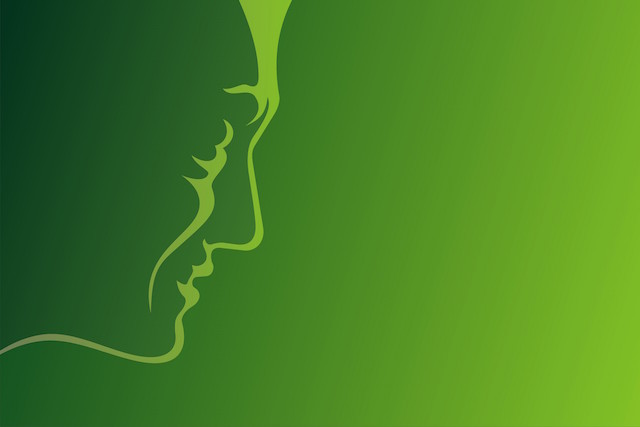
“Your pain is the breaking of the shell that encloses your own understanding.” ~Khalil Gibran
There was a time in my life where I felt like everything needed to seem okay.
I had trouble achieving emotional closeness in my relationships, I was unsatisfied in my career, and I struggled with at times severe anxiety and depression. But I was always “okay,” and actually went great lengths to hide any sign that I wasn’t.
I kept myself busy to avoid seeming “lame” by having nothing to do, or perhaps to avoid the feelings that would come up if I had nothing to do. If I felt insecure or dissatisfied with something, I’d simply lie and try to cover it up rather than ever acknowledge there was a problem.
Feeling alone and not heard in my friendships? Well, everyone else seems to be fine, so I’ll just pretend I’m fine too. Uncomfortable feelings? Push them down and ignore them, always. And if someone did something to hurt or offend me, I never said anything, because I wasn’t able to stand up for myself or set boundaries.
I’m still trying to understand the origin of these feelings, but for me, it was dealing with generations of family trauma and hurt, as well as realizing that I’m bisexual. It was also receiving the message, implicitly and sometimes explicitly, that as a woman, it wasn’t okay for me to speak up and stand up for myself.
Essentially, at some point, I came to believe that my real feelings weren’t acceptable.
And the reality is, it was incredibly lonely. This perception left me unable to truly connect with anyone, because I felt as though they wouldn’t like the real me. But everyone else seemed like they were fine, so I pushed down who I was and my own personality to be who I thought I should be to fit in.
I think we all struggle with this to some degree. Everyone has weird habits and secrets they keep to themselves. But for some of us, we feel like something is fundamentally wrong with us, as though if people saw our real selves, they wouldn’t like us. And so we hide it, and act in ways that we think we “should” act to seem like everyone else.
The problem with this is that it makes life a lot more complicated when you have to suppress your own reaction or feelings, think about it, and then do what you assume other people would do in your situation.
I always tried to hide and minimize any discomfort, pretend I felt more comfortable in my relationships than I did and was happier with my life than I was. Not that the people around me weren’t wonderful people, but I didn’t ever feel that I belonged or was known.
In fact, in my early twenties, I had everything I could possibly want—a college degree, my own place, a relationship, great friends, and a job with a prestigious company. And I wasn’t happy. Or perhaps there was a part of me that was unfulfilled. Everything in my life was great, but I simply didn’t feel seen.
The problem with always being “okay” is that at some point you just can’t do it anymore. And unsurprisingly, there came a point when my life fell apart.
I experienced unemployment, a series of failed romantic relationships, and health issues, including disordered eating. In many ways, my life is still “apart.” Making changes has involved a lot of yoga, meditation, and emotional work, and even some solo traveling. It has been difficult and painful, and I have lost relationships.
But the truth is that this previous “me” was like a house of cards, or perhaps a house with a cracked foundation. I pushed a lot of things down, I never stood up for myself or expressed my real feelings or needs, or even had any idea what those were—and that simply wasn’t a sustainable way to live.
The most important step I took, and that I believe anyone can take, is finally stopping and recognizing when things are not okay. We can’t fix what we won’t acknowledge, and it is impossible to make changes if we refuse to admit something is wrong.
Had life not presented me with the chaos it did, I would have continued to push my way along, shoving down any unwanted feelings and avoiding addressing them but also avoiding the growth, connection, and happiness that comes from actually facing my fears and emotions, and working through them with other people.
Before, I had operated from the clearly faulty assumptions that any differences or unique qualities I had, such as my sensitivity and introverted, empathic nature—or, you know, things that make me a human being—were shameful and bad and must be covered up, that I was “too sensitive,” and that being assertive was definitely taboo. And above all, I must never admit it if I needed help. So I just went with what life gave me and tried my best to fit in.
I’m learning to sit with difficult feelings and situations and trying to understand them instead of constantly running away from them.
I am also working on communicating with people when they upset me. Sometimes they don’t have any idea, and promise to make sure it doesn’t happen again. But if they don’t care, that is something I need to know too. And instead of giving in to my insatiable need to fit in and be like everyone else, I’m trying to just be honest and be myself.
Finally, instead of running, I’m trying to acknowledge when life isn’t good. Because acknowledging this, and understanding what uncomfortable feelings have to teach me, is the only way to actually make anything better.
About Shannon Brown
Shannon spent several years as a writer and editor at a public health agency in Washington, DC. She then spent a total of eight months over the past two years backpacking through Europe, and is now a writer and yoga teacher in Brooklyn, NY. Find her on Instagram (@shannonb_808) or her blog, balanced-perspective.com.













 Though I run this site, it is not mine. It's ours. It's not about me. It's about us. Your stories and your wisdom are just as meaningful as mine.
Though I run this site, it is not mine. It's ours. It's not about me. It's about us. Your stories and your wisdom are just as meaningful as mine.